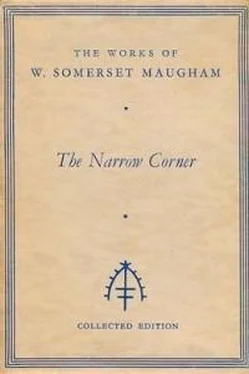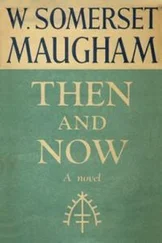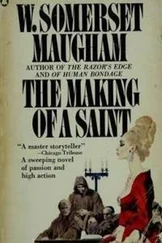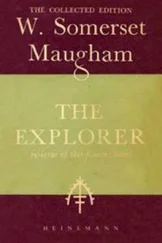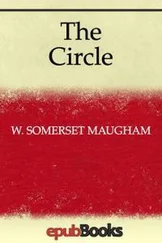1 ...7 8 9 11 12 13 ...51 “Fixed ’im up all right?” enquired the skipper indifferently.
“He’s pretty bad.”
“Is that the paper?” Fred asked.
He took it out of the doctor’s hand, and strolled forwards.
“Play cribbage?” said Nichols.
“No, I don’t.”
“Me and Fred play it every night. Luck of the devil ’e ’as. I shouldn’t like to tell you ’ow much money ’e’s won off me. It can’t go on. It must turn soon.” He called out: “Come on, Fred.”
“Half a mo.”
The skipper shrugged his shoulders.
“No manners. Anxious to see a paper, wasn’t ’e?”
“And a month old one at that,” answered the doctor. “How long is it since you left Thursday Island?”
“We never went near Thursday Island.”
“Oh!”
“What about a spot? D’you think it’d do me any ’arm?”
“I don’t think so.”
The skipper shouted for Tom Obu, and the blackfellow brought them a couple of glasses and some water. Nichols fetched the whisky. The sun set and the night crept softly over the still water. The only sound that broke the silence was the leap now and then of a fish. Tom Obu brought a hurricane lamp and placed it on the deck–house, and going below lit the smoking oil lamp in the cabin.
“I wonder what our young friend is readin’ all this time.”
“In the dark?”
“Maybe ’e’s thinkin’ of what ’e ’as read.”
But when at last Fred joined them and sat down to finish the interrupted game, it seemed to Dr. Saunders, in the uncertain light, that he was very pale. He had not brought the paper with him and the doctor went forward to get it. He could not see it. He called Ah Kay and told him to look for it. Standing in the darkness he watched the players.
“Fifteen two. Fifteen four. Fifteen six. Fifteen eight and six are fourteen. And one for his nob seventeen.”
“God, what luck you ’ave.”
The skipper was a bad loser. His face was set and hard. His shifty eyes glanced at each card he turned up with a sneering look. But the other played with a smile on his lips. The light of the hurricane lamp cut his profile out of the darkness, and it was astonishingly fine. His long lashes cast a little shadow on his cheeks. Just then he was more than a handsome young man; he had a tragic beauty that was very moving. Ah Kay came and said he could not find the paper.
“Where did you leave that ‘Bulletin,’ Fred?” asked the doctor. “My boy can’t find it.”
“Isn’t it there?”
“No, we’ve both looked.”
“How the hell should I know where it is? Two for his heels.”
“Throw it overboard when you done with it?” asked the captain.
“Me? Why should I throw it overboard?”
“Well, if you didn’t it must be somewhere about,” said the doctor.
“That’s another game to you,” the skipper growled. “I never see anyone ’old such cards.”
IT was between one and two in the morning. Dr. Saunders sat in a deck–chair. The skipper was asleep in the cabin and Fred had taken his mattress forrard. It was very still. The stars were so bright that the shape of the island was very distinctly outlined against the night. Distance is less an affair of space than of time and though they had gone but five–and–forty miles it seemed to the doctor that Takana was very far away. London was at the other end of the world. He had a fleeting vision of Piccadilly Circus, with its bright lights, the crowd of buses, cars and taxis, and the crowd that surged when the theatres disgorged their audiences. There was a part that in his day they called the Front, the street on the north side that led from Shaftesbury Avenue to the Charing Cross Road, where from eleven to twelve people walked up and down in a serried throng. That was before the war. There was a sense of adventure in the air. Eyes met and then…. The doctor smiled. He did not regret the past; he regretted nothing. Then his wandering thoughts hovered over the bridge at Fu–chou, the bridge over the Min River, from which you saw the fishermen in the barges below fishing with cormorants; rickshaws crossed the bridge, and coolies bearing heavy loads, and the innumerable Chinese walked to and fro. On the right bank as you looked downstream was the Chinese City with its crowded houses and its temples. The schooner showed no light and the doctor only saw it in the darkness because he knew that it was there. All was silent on board. But in the hold where the pearl shell was piled, on one of the wooden bunks along the side, lay the dying diver. The doctor attached small value to human life. Who, that had lived so long amid those teeming Chinese where it was held so cheap, could have much feeling about it? He was a Japanese, the diver, and probably a Buddhist. Transmigration? Look at the sea: wave follows wave, it is not the same wave, yet one causes another and transmits its form and movement. So the beings travelling through the world are not the same to–day and to–morrow, nor in one life the same as in another; and yet it is the urge and the form of the previous lives that determine the character of those that follow. A reasonable belief but an incredible. But was it any more incredible than that so much striving, such a variety of accidents, so many miraculous hazards should have combined, through the long æons of time, to produce from the primeval slime at long last this man who, by means of Flexner’s bacillus, was aimlessly snuffed out? Dr. Saunders thought it odd, but natural, senseless certainly, but he had long made himself at home in the futility of things. Of course the spirit was a difficulty. Did that cease to exist when the matter which was its instrument dissolved? In that lovely night, his thoughts flowing without purpose, like birds, sea–gulls, wheeling over the sea, rising and falling as the wind took them, he could not but keep an open mind.
There was the sound of shuffling steps on the companion and the skipper appeared. The stripe of his pyjamas was bold enough to tell against the darkness.
“Captain?”
“It’s me. I thought I’d come up for a breath of air.” He sank into the chair by the doctor’s side. “Had your smoke?”
“Yes.”
“I’ve never took to it meself. I’ve known a good many as did, though. Never seemed to do ’em much ’arm. Settles the stomach, they say. One fellow I knew went all to pieces. Skipper of one of Butterfield’s boats on the Yang–tze at one time. Good position and everything. They thought a rare lot of ’im. Sent him ’ome once to get cured, but ’e took to it again the moment ’e come back. Ended up as a tout for a fan–tan ’ouse. Used to ’ang about the docks at Shanghai and cadge ’alf–dollars.”
They were silent for a while. Captain Nichols sucked a briar pipe.
“Seen anythin’ of Fred?”
“He’s sleeping on deck.”
“Funny thing about that paper. He didn’t want you and me to read somethin’.”
“What d’you suppose he did with it?”
“Dropped it overboard.”
“What’s it all about?”
The skipper gave a low chuckle.
“Believe me, or believe me not, I don’t know any more than you do.”
“I’ve lived in the East long enough to know that it’s better to mind my own business.”
But the skipper was inclined to be confidential. His digestion was not troubling him and after three or four hours of good sleep he felt very wide awake.
“There’s somethin’ fishy about it, I know that, but I’m like you, doc, I’m all for mindin’ me own business. Ask no questions an’ you’ll be told no lies. That’s what I say, an’ if you get a chance of makin’ a bit of money, take it quick.” The skipper gave his pipe a pull. “You won’t let this go any further, will you?”
Читать дальше
Конец ознакомительного отрывка
Купить книгу
